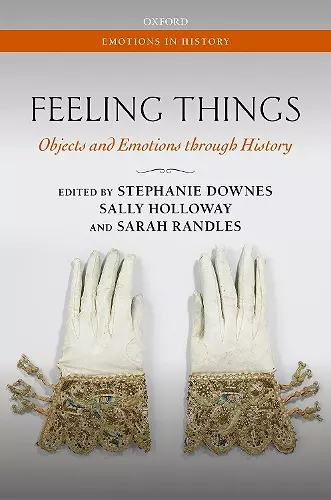Feeling Things
Objects and Emotions through History
Stephanie Downes editor Sally Holloway editor Sarah Randles editor
Format:Hardback
Publisher:Oxford University Press
Published:18th Jan '18
Currently unavailable, and unfortunately no date known when it will be back

This interdisciplinary essay collection investigates the various interactions of people, feelings, and things throughout premodern Europe. It focuses on the period before mass production, when limited literacy often prioritised material methods of communication. The subject of materiality has been of increasing significance in recent historical inquiry, alongside growing emphasis on the relationships between objects, emotions, and affect in archaeological and sociological research. The historical intersections between materiality and emotions, however, have remained under-theorised, particularly with respect to artefacts that have continuing resonance over extended periods of time or across cultural and geographical space. Feeling Things addresses the need to develop an appropriate cross-disciplinary theoretical framework for the analysis of objects and emotions in European history, with special attention to the need to track the shifting emotional valencies of objects from the past to the present, and from one place and cultural context to another. The collection draws together an international group of historians, art historians, curators, and literary scholars working on a variety of cultural, literary, visual, and material sources. Objects considered include books, letters, prosthetics, religious relics, shoes, stone, and textiles. Many of these have been preserved in international galleries, museums, and archives, while others have remained in their original locations, even as their contexts have changed over time. The chapters consider the ways in which emotions such as despair, fear, grief, hope, love, and wonder become inscribed in and ascribed to these items, producing 'emotional objects' of significance and agency. Such objects can be harnessed to create, affirm, or express individual relationships, as, for example, in religious devotion and practice, or in the construction of cultural, communal, and national identities.
...constantly challenges the reader to consider yet another perspective on what thinking with materiality might do for the emotions scholar. It is interesting as a whole, but it is also a collection that has produced some essays of remarkable quality, a pleasure to read. * Katie Barclay, University of Adelaide, Parergon *
The historians in this volume represent an exemplary range of skills and array of methodological tools for the analysis of historical stuff. Dynamics of power, presences of historical bodies, traces of historical selves, all emerge from material evidence and the ways in which it has been marked, used or applied. As an advertisement for the importance of material history, this book could not have done a finer job. The editors' introduction alone is an essential primer on work in this field, and recommended as a good place to begin for anyone seeking exposure to the variety of methods historians use to handle the physical stuff of history. * Rob Boddice, Reviews in History *
This excellent volume is a must-read for all emotions students and scholars. In the hands of three insightful editors, the book makes an important methodological statement about the field of emotions history, and maps future research trajectories by successfully intertwining the field with theories and methods from material culture studies. * Sasha Handley, Emotions: History, Culture, Society *
Feeling Things is a welcome and timely addition to scholarship in the fields of both material culture studies and the history of emotions. * Una McIlvenna, Cultural History *
The chapters in this collection are engaging and fascinating. Although all the objects examined are from the medieval or early modern period, the arguments the authors make regarding the way objects can affect our lives, and the way our lives affect objects, resonate with other time periods and disciplines. * Lexi Earl, LSE Review of Books *
ISBN: 9780198802648
Dimensions: 236mm x 165mm x 22mm
Weight: 576g
270 pages